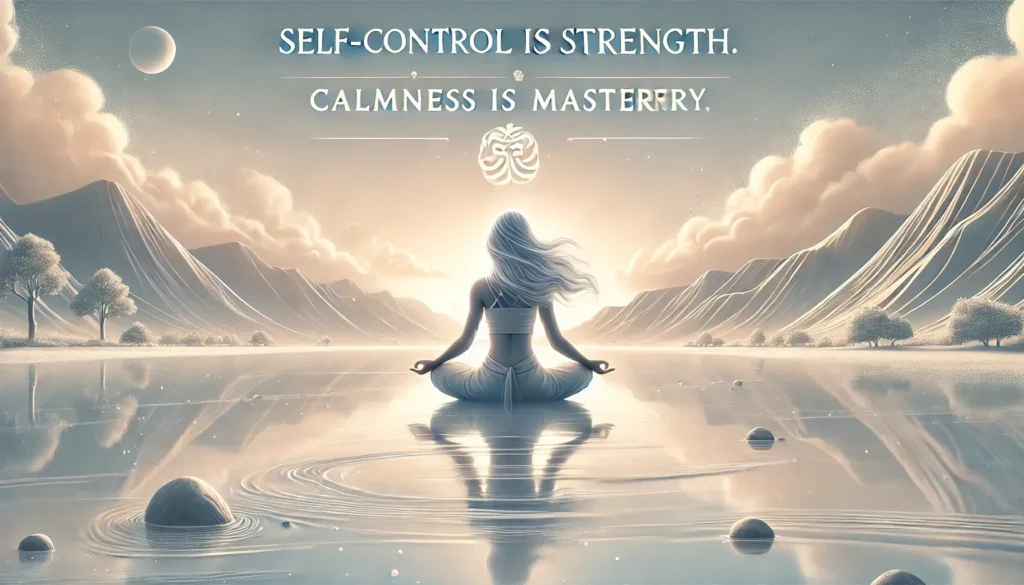In our fast-paced world, self-control is strength. calmness is mastery. you – tymoff serves as a powerful reminder of the importance of these qualities. Cultivating self-control and calmness can significantly impact our ability to navigate life’s challenges with grace and resilience. This article will explore the relationship between self-control and calmness, their psychological underpinnings, practical strategies for improvement, and the long-term benefits of mastering these traits.
Understanding Self-Control
Self-control is strength. calmness is mastery. you – tymoff reflects the essence of self-control as the ability to regulate one’s thoughts, emotions, and actions. It is crucial for resisting temptations and staying focused on long-term goals. When we talk about self-control, we often refer to the capacity to manage impulses and make choices aligned with our values and objectives.
The Importance of Self-Control
Self-control is strength. calmness is mastery. you – tymoff plays a vital role in various aspects of life, including personal growth, relationships, and professional success. By mastering self-control, individuals can achieve their goals more effectively, enhance their decision-making skills, and improve their overall quality of life.
Understanding Calmness
Self-control is strength. calmness is mastery. you – tymoff also pertains to calmness, which refers to a state of mental and emotional stability, characterized by tranquility and composure. It allows individuals to maintain focus and clarity in stressful situations. When we practice calmness, we can respond to challenges thoughtfully rather than react impulsively.
The Significance of Calmness
Self-control is strength. calmness is mastery. you – tymoff emphasizes that calmness not only reduces stress and anxiety but also enhances our ability to think critically and solve problems. It fosters a more positive outlook on life and improves our interactions with others, creating a harmonious environment.
The Connection Between Self-Control and Calmness
Self-control is strength. calmness is mastery. you – tymoff highlights the intertwined relationship between self-control and calmness. When we learn to control our emotions, we can maintain calmness even in challenging situations. Conversely, practicing calmness helps us enhance our self-control by allowing us to respond to stimuli more thoughtfully.
The Psychology Behind Self-Control and Calmness
Self-control is strength. calmness is mastery. you – tymoff encourages us to understand the psychology behind these qualities to grasp their significance in our lives. Here are some key aspects:
| Aspect | Self-Control | Calmness |
| Definition | Ability to regulate thoughts and actions | State of mental and emotional stability |
| Emotional Influence | Helps manage impulses and reactions | Fosters tranquility in stressful situations |
| Impact on Decisions | Enhances rational decision-making | Promotes clear thinking and problem-solving |
| Long-term Benefits | Supports personal growth and goal achievement | Improves relationships and overall well-being |
Common Misconceptions About Self-Control
Self-control is strength. calmness is mastery. you – tymoff addresses several misconceptions about self-control. Despite its importance, these myths can hinder our understanding of its true value:
- Self-Control is Innate: Many believe that self-control is an inherent trait. In reality, it can be developed through practice and awareness.
- Self-Control Means Suppressing Emotions: Some think that self-control requires suppressing emotions. Instead, it involves managing emotions effectively while still experiencing them.
- Mastering Self-Control is Quick: People often underestimate the time and effort needed to develop self-control. It is a gradual process that requires patience and dedication.
Strategies for Improving Self-Control
Self-control is strength. calmness is mastery. you – tymoff is an essential reminder that developing self-control requires intentional effort and practice. Here are some effective strategies to enhance self-control:
1. Set Clear Goals
Self-control is strength. calmness is mastery. you – tymoff emphasizes that establishing clear, achievable goals provides direction and motivation. Break larger goals into smaller, manageable steps to maintain focus and momentum.
2. Cultivate Self-Awareness
Self-control is strength. calmness is mastery. you – tymoff also relates to increasing self-awareness, which helps identify triggers that lead to impulsive behavior. By understanding these triggers, individuals can develop strategies to manage them effectively.
3. Practice Mindfulness
Self-control is strength. calmness is mastery. you – tymoff highlights the importance of mindfulness techniques, such as meditation and deep breathing, which can improve self-control by promoting emotional regulation and mental clarity. Regular mindfulness practice fosters greater awareness of thoughts and emotions.
4. Avoid Temptations
Self-control is strength. calmness is mastery. you – tymoff encourages individuals to identify and avoid situations that may lead to impulsive behavior. Create an environment that supports self-control by minimizing distractions and temptations.
5. Develop Healthy Habits
Self-control is strength. calmness is mastery. you – tymoff underlines that establishing healthy routines reinforces self-control. Incorporate regular exercise, balanced nutrition, and sufficient sleep to improve overall well-being and resilience.
6. Reward Progress
Self-control is strength. calmness is mastery. you – tymoff is a reminder that recognizing and celebrating small achievements along the way is important. Rewarding progress reinforces positive behavior and motivates continued efforts to improve self-control.
Techniques for Cultivating Calmness
Self-control is strength. calmness is mastery. you – tymoff is also essential for cultivating calmness, which is crucial for maintaining emotional stability. Here are some effective techniques to achieve this:
1. Deep Breathing Exercises
Self-control is strength. calmness is mastery. you – tymoff encourages practicing deep breathing, which helps regulate the body’s stress response. Taking slow, deep breaths can induce a state of relaxation and reduce anxiety.
2. Engage in Regular Meditation
Self-control is strength. calmness is mastery. you – tymoff emphasizes that meditation is a powerful tool for fostering calmness. It allows individuals to focus their thoughts and develop a sense of inner peace.
3. Connect with Nature
Self-control is strength. calmness is mastery. you – tymoff highlights that spending time in nature can have a calming effect on the mind. Engaging in outdoor activities promotes tranquility and provides a break from daily stressors.
4. Establish a Healthy Sleep Routine
Self-control is strength. calmness is mastery. you – tymoff underlines the importance of prioritizing sleep for emotional regulation. Aim for 7-9 hours of quality sleep each night to support mental clarity and emotional stability.
5. Limit Exposure to Stressors
Self-control is strength. calmness is mastery. you – tymoff advises reducing exposure to negative influences, such as excessive social media or toxic relationships, to help maintain a calm mindset.
Real-Life Applications
Self-control is strength. calmness is mastery. you – tymoff is vital for applying these traits in everyday situations for personal growth. Here are some examples:
- In the Workplace: Practicing self-control helps manage stress and maintain productivity, leading to better job performance and relationships with colleagues.
- In Personal Relationships: Calmness fosters effective communication and conflict resolution, enhancing interpersonal relationships and promoting understanding.
- In Academic Settings: Students who develop self-control can focus better on their studies and resist distractions, leading to improved academic performance.
Long-Term Benefits of Mastering Self-Control and Calmness
Self-control is strength. calmness is mastery. you – tymoff encapsulates the profound long-term benefits of mastering these qualities. Here are some key advantages:
- Improved Mental Health: Individuals who practice self-control and calmness experience reduced stress and anxiety, leading to better overall mental health.
- Enhanced Decision-Making: Mastering these qualities promotes rational decision-making, resulting in better choices in personal and professional life.
- Greater Resilience: Developing self-control and calmness helps individuals face challenges with confidence, leading to increased resilience and adaptability.
Conclusion
Self-control is strength. calmness is mastery. you – tymoff highlights the essential nature of these qualities in achieving personal growth and emotional resilience. By cultivating self-control, individuals can manage their impulses, make better decisions, and navigate life’s challenges with grace. Similarly, mastering calmness allows for improved emotional regulation and clarity in difficult situations.
As you work on enhancing these traits, remember that the journey requires patience, dedication, and practice. By implementing the strategies and techniques discussed in this article, you can unlock the transformative power of self-control and calmness, ultimately leading to a more fulfilling and balanced life.
FAQs
1. Can anyone develop self-control and calmness?
Yes, self-control and calmness can be cultivated by anyone through practice and awareness.
2. How do self-control and calmness benefit personal and professional life?
They enhance decision-making, improve productivity, reduce stress, and foster better relationships.
3. What techniques can help in cultivating calmness?
Deep breathing, meditation, spending time in nature, and establishing a healthy sleep routine are effective techniques.
4. Can self-control and calmness be applied to specific situations, such as managing anger or overcoming cravings?
Absolutely. They can be applied in various situations to improve emotional regulation and decision-making.
5. How long does it take to develop self-control and calmness?
The time varies for each individual, but consistent effort and practice can lead to noticeable improvements over time.


